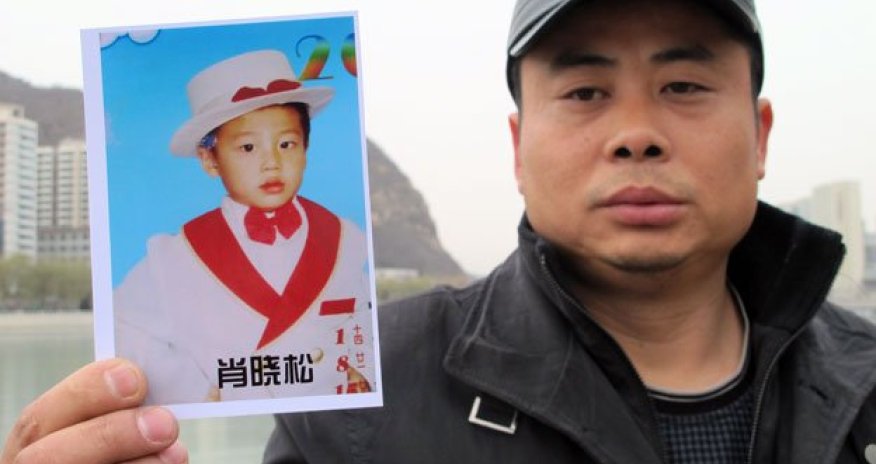The father searching for his abducted son

An illegal market in children has developed in China, in which babies are being openly sold online. Police say many of the victims are from the estimated 20,000 children abducted each year - a crime with a devastating impact on separated children and parents.
It was a few days before the Chinese New Year in February 2007 and Xiao Chaohua was working at his small clothes shop in an industrial zone of Huizhou, a city in China's Pearl River delta, not far from Hong Kong.
Xiao's five-year-old son, Xiaosong, was in a playful mood. A couple of hours earlier, they had visited a nearby beach where they had made sandcastles and paddled in the surf. "He was so happy that day," says his father. "I took lots of pictures of him on my phone."
On the motorbike ride back home, Xiaosong fell asleep and lost one of his shoes. When his mother found out she scolded them for being careless. But the shop was full of workers from nearby factories buying new clothes for the holiday and there was no time to argue.
At about seven in the evening, as dusk was falling, Xiaosong asked his father for some money to buy his favourite snack - the sweet milk from a grocery shop just around the corner. His 10-year-old sister, Xiao Lu, would accompany him. Xiao thought nothing of it and gave Xiaosong some small change.
It was the last time he saw his son.
Xiao realised something was wrong when his daughter returned alone. The two children had split up after Lu had gone to speak to a friend.
He immediately began searching. At first he checked the grocery store, then the internet cafe, but found nothing. He called the police and an officer arrived.
Xiao says the policeman said there was no point in looking as his son had probably been snatched and already taken to another city. But Xiao was undeterred. A few hours later, he found a migrant worker who he had previously seen playing with Xiaosong at a games arcade. The man was taken to the police station for questioning but was released as there was no evidence against him. He then vanished.
During the first week, Xiao paid for a missing person advertisement on local TV. It cost him 50,000 rmb (£5,200, $8,000). There was no response. So he kept on searching. Days became weeks, weeks became months, and months turned into years. "I had no plans," he says. "I just went crazy. I just went wherever I could find people, wherever I could find crowds."
For the first year, he rode his motorbike across Guangdong province - China's manufacturing heartlands. He would put up missing posters in bus stations, train stations and shopping malls, offering a reward for any information.
Eventually he sold his shop and with the proceeds bought a van. His wife got a job at a shoe factory and their daughter was sent back to their home town in Jiangxi province to be looked after by her grandparents.
And then Xiao began an extraordinary journey across China. He travelled from the edges of the Tibetan plateau to the country's mega-cities, to small villages down dusty roads. His journey has taken him to places he could never have imagined.
Thousands of Chinese parents experience Xiao's agony every year. The Chinese government provides no figures, but the US State Department has estimated that 20,000 children are abducted annually, or 400 a week.
Chinese state media have suggested the true figure could even be 200,000 per year, though the police reject this higher estimate.
A baby boy can sell for up to 100,000 rmb (£10,500, $16,000), it's reported, double the price for a girl. There is a traditional preference for boys in Chinese culture as they carry on the family name and provide financial support for elderly parents.
Once abducted, children are most often sold for adoption but some are forced to work as beggars for criminal gangs. The vast majority of those abducted are simply lost forever.
(BBC)
ANN.Az
Similar news
Similar news




































 Photo
Photo 



 Video
Video 

